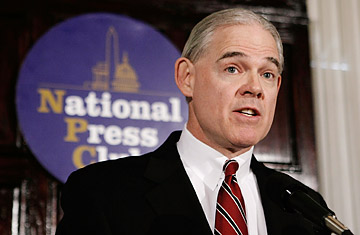
Charles Cooper, lead attorney for California's defense of Proposition 8
(2 of 2)
As a result, he argues, the government interest in laws like Prop 8 needs be subjected only to the lowest level of constitutional scrutiny, an equal-protection standard known as rational-basis review. Ten previous courts have held that laws discriminating against gays need only survive scrutiny under the more permissive rational-basis review, he argues. "The unanimity of these decisions is no accident, for the question whether gays and lesbians satisfy the requirements for suspect-class status is not a close one. As an initial matter, homosexuality is a complex and amorphous phenomenon that defies consistent and uniform definition. As well-respected researchers have concluded, 'there is currently no scientific or popular consensus on the exact constellation of experiences that definitively 'qualify' an individual as lesbian, gay or bisexual.' "
Walker ruled the other way, citing the long trail of evidence presented at trial by Olson and Boies, whose cross-examinations again and again weakened the testimony of the Prop 8 proponents' two witnesses. Olson claimed after the rulings that the factual record established at trial had been "exhaustive and comprehensive" and "highly favorable." He told TIME last week, 'We feel that we have a powerful and compelling record to lay before the appellate courts. We can't do more than that."
But the facts of the case will only matter if the Ninth Circuit — and later, the Supreme Court, if the case gets there — says they do. And in his brief, Cooper does everything he can to give the higher courts a path that steers clear of the box of facts that Olson and Boies presented — and Walker endorsed in his decision — at trial. Even if the higher courts ultimately agree with just about everything Walker says the plaintiffs proved at trial, they will still be free to strike down gay marriage if they fault Walker's legal reasoning.
And for those looking to understand what's to come, the best hints available from the early flurry of filings in the Ninth Circuit center on Cooper's decision to take aim squarely at the starting point of Walker's ruling. He directly questions the claim that Walker makes early in his opinion that the Prop 8 case rests on conclusions reached by Justice Anthony Kennedy in the Supreme Court's Lawrence v. Texas case, the landmark gay-rights case from 2003 in which Kennedy famously declared that moral condemnation alone cannot justify the denial of rights to citizens. Walker chose that anchor carefully: Kennedy will likely be the decisive vote should the Prop 8 case reach the high court.
But Cooper's briefs shows that his full appeal will challenge that basic reading to its core. "From the dawn of the American Revolution, which was preached from the pulpits, to the abolitionist preachers who rallied the antislavery cause, to the religious leaders who inspired the civil rights movement, religion and morality have always played a prominent and entirely proper role in American political life," he wrote. "Nor can the Supreme Court's decision in Lawrence v. Texas be understood to have brought this long tradition to a grinding halt and to have effectively expelled from the political process Americans whose views on issues of profound social and cultural importance are entwined with their faith or moral values. Lawrence held only that moral disapproval of homosexual relationships could not justify a law criminalizing 'the most private human conduct, sexual behavior, in the most private of places, the home.' "
So as the case speeds to a December showdown, once again it looks like the long arm of Lawrence will be the terrain on which the battle for gay marriage is fought.
